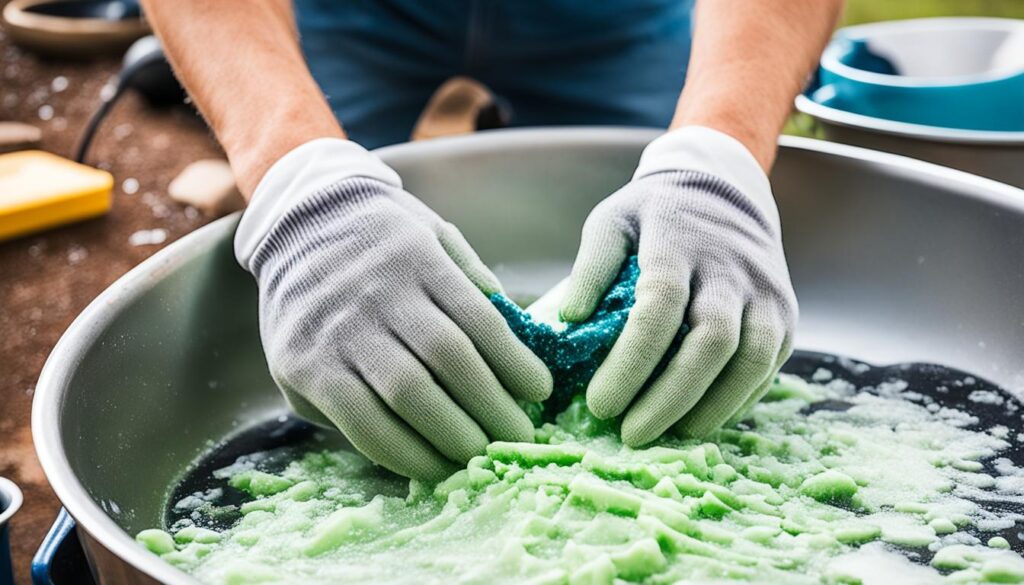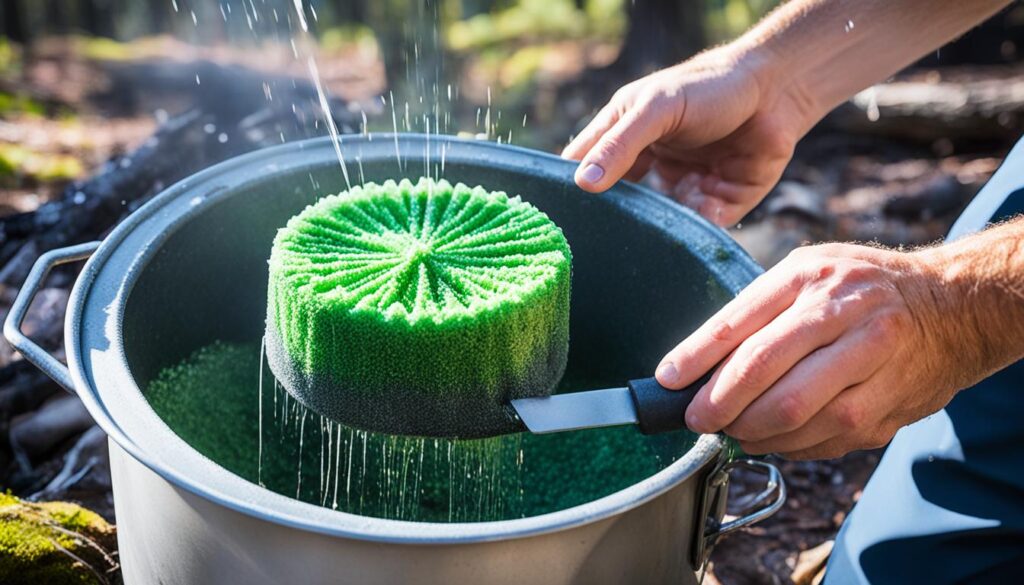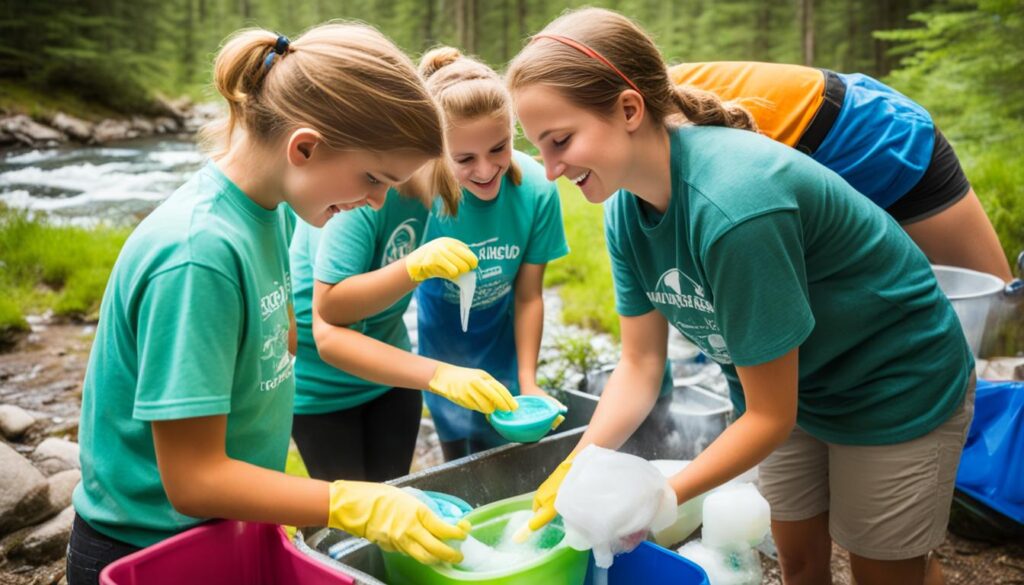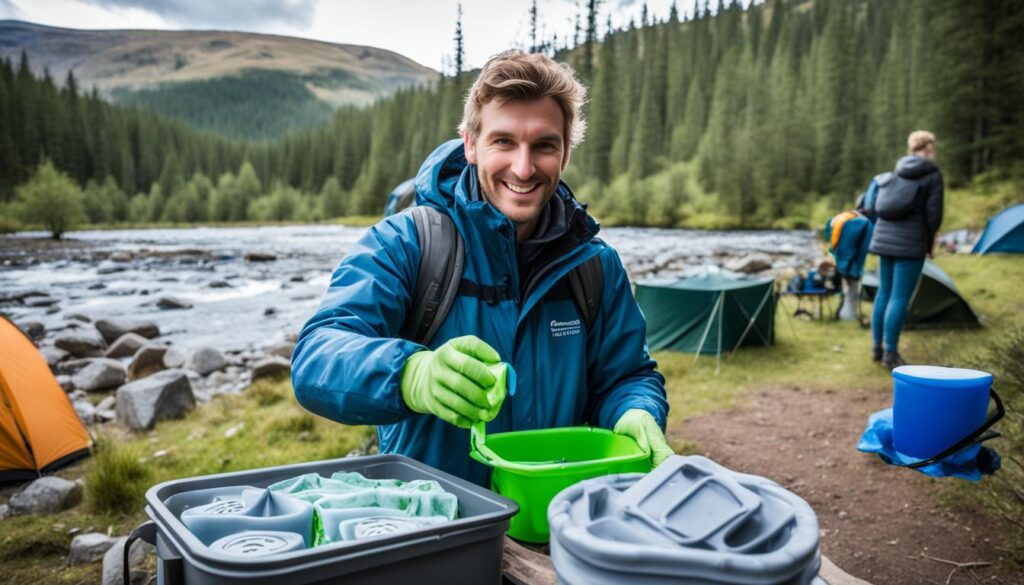When you’re out camping, enjoying the great outdoors, the last thing you want to worry about is dirty dishes piling up. But how do you clean dishes while camping without the convenience of a dishwasher or a proper sink? In this article, I will share some essential tips and tricks for efficient dishwashing that will make your camping experience much more enjoyable and hassle-free.
First and foremost, it’s important to be prepared with the right equipment. Camping kitchen essentials such as collapsible camping sinks, plastic bins, or buckets can serve as makeshift sinks for washing dishes. A pan scraper is handy for removing food residue, while a sponge or brush can be used for cleaning. Biodegradable soap is not only environmentally friendly, but it also helps minimize the impact on nature.
Now that you have your camping kitchen set up, let’s dive into some tips for washing dishes at a campground. If the campsite has designated dishwashing facilities, it’s best to make use of them. These facilities often have drain water basins and are specifically designed for handling food waste. Avoid washing dishes in the bathroom sink or at the drinking water spigot, as these areas are not suitable for handling food waste and can attract animals.
When it comes to the actual dishwashing process, remember to conserve water. Use a fine-mesh strainer to remove solid food waste before washing, as this will prevent clogging the sink or polluting the water source. Be conscious of the amount of soap you use to avoid excessive suds, which can be difficult to rinse off without an abundance of water.
Cleaning dishes while camping doesn’t have to be a tedious task. With the right techniques and equipment, you can efficiently clean your dishes and maintain cleanliness and hygiene during your outdoor adventure. So, pack your camping kitchen essentials and be well-prepared to enjoy your camping trip without the worry of dirty dishes.
Key Takeaways:
- Bring collapsible camping sinks, plastic bins, or buckets to serve as makeshift sinks for dishwashing.
- Use a pan scraper to remove food residue and a sponge or brush for cleaning.
- Opt for biodegradable soap to minimize environmental impact.
- If available, use designated dishwashing facilities at the campground.
- Remember to conserve water and dispose of dishwater responsibly.
If you are camping at a developed campground that has designated dishwashing facilities, it is recommended to use them. These facilities often have drain water basins and are designed for handling food waste. Avoid washing dishes in the bathroom sink or at the drinking water spigot, as these areas are not suitable for handling food waste and can attract animals. Always be prepared to wash your own dishes at your campsite and responsibly dispose of your dishwater.
When washing dishes at a campground, here are some efficient dish cleaning techniques for camping:
- Use biodegradable soap: Choose a biodegradable soap specifically designed for camping, as it is better for the environment.
- Minimize water usage: Fill one basin with soapy water and another with clean water for rinsing. This allows you to wash multiple dishes without constantly running water.
- Scrape off food residue: Before washing, use a pan scraper or a spatula to remove excess food from the dishes. This will make the cleaning process easier and prevent food scraps from clogging the drain.
- Use a sponge or brush: Scrub the dishes with a sponge or brush to remove any remaining food particles. Pay extra attention to greasy dishes and utensils.
- Rinse thoroughly: After washing, rinse the dishes under clean running water or in a separate basin to remove all soap residue.
- Dry dishes properly: Air-dry the dishes or use a clean dish towel. Avoid using paper towels, as they can create unnecessary waste.
Remember, portable dish washing solutions for camping can vary depending on your specific needs and the facilities available at your campground. It is important to follow any campground regulations regarding dishwashing and waste disposal.
Quote:
“Efficient dish cleaning techniques for camping not only save time and resources but also help preserve the natural beauty of our campgrounds.”

| Pros of using campground dishwashing facilities: | Cons of using campground dishwashing facilities: |
|---|---|
| Convenient and designed for handling food waste | May require waiting for availability during peak camping seasons |
| Reduced risk of attracting animals | Potential for other campers not cleaning properly, leaving dirty sinks |
| Maintains cleanliness at the campsite | Limitations on cleanliness and hygiene depending on the facilities |
Essential Equipment for Camping Dishwashing
When it comes to outdoor adventures, proper dishwashing becomes a crucial part of maintaining cleanliness and hygiene. To ensure efficient dish cleaning while minimizing water waste, it is essential to have the right camping dish cleaning supplies. Here are the must-have items for setting up a camping dishwashing station:
| Equipment | Description |
|---|---|
| Collapsible Camping Sinks | Portable and space-saving sinks that can hold water for washing and rinsing dishes. |
| Plastic Bins or Buckets | Alternatively, plastic bins or buckets can be used as makeshift sinks, offering a more budget-friendly option. |
| Pan Scraper | A tool specifically designed to remove food residue from dishes, making cleaning easier. |
| Sponge or Brush | Choose a durable cleaning tool that can effectively scrub away grease and grime without damaging the dishes. |
| Biodegradable Soap | Opt for environmentally friendly soap to minimize the impact on nature and wildlife. |
| Fine-Mesh Strainer | Use a strainer to prevent solid food waste from going down the drain or contaminating the water source. |
| Clean Dish Towels or Drying Rack | Ensure you have a method for drying the dishes, either by using clean dish towels or a portable drying rack. |
By having these essential camping dish cleaning supplies, you can maintain cleanliness while embracing sustainable practices. Utilize collapsible sinks or plastic bins as your portable dishwashing station. Remove food residue with the help of a pan scraper and scrub away dirt using a sponge or brush. Use biodegradable soap to minimize environmental impact, and strain out solid food waste with a fine-mesh strainer. Finally, dry your dishes using clean dish towels or a drying rack.
With the right equipment on hand, you can ensure a hassle-free and eco-friendly dishwashing experience while camping.
Step-by-Step Guide for Washing Dishes While Camping
When it comes to cleaning dishes while camping, it’s essential to have quick and easy methods that are also eco-friendly. Follow these step-by-step instructions to ensure a seamless dishwashing experience:
- Gather your supplies: Start by collecting all the necessary items for dish cleaning. This includes biodegradable soap, a sponge or brush, a collapsible camping sink or a plastic bin, a pan scraper, a fine-mesh strainer, and clean dish towels or a drying rack.
- Scrape off excess food: Before washing the dishes, use a pan scraper or a spatula to remove any leftover food debris. This will help prevent clogging the sink or contaminating the dishwater.
- Prepare the dishwashing area: Set up your collapsible camping sink or plastic bin as your dishwashing station. Fill it with warm water and add a small amount of biodegradable soap.
- Wash the dishes: Start by washing the least dirty items first, such as cups or utensils. Use the sponge or brush to scrub the dishes thoroughly, making sure to remove any grease or food residue. Pay extra attention to the areas that come in contact with your mouth.
- Rinse the dishes: After washing each item, rinse it in clean water to remove any soap residue. This can be done by either using a separate container with clean water or by pouring water over the dish directly.
- Strain and dispose of solids: Before draining the dishwater, use a fine-mesh strainer to collect any solid food particles. Properly dispose of these particles in a trash bag or designated waste area to minimize environmental impact.
- Dispose of the dishwater: Carefully dispose of the dishwater following the campground’s regulations. If there are designated dishwashing facilities, use them. Otherwise, ensure the dishwater is dispersed at least 200 feet away from any water sources to avoid contamination.
- Dry the dishes: Once the dishes are clean and rinsed, either air-dry them on a clean dish towel or a drying rack. If time is limited, use a clean towel to dry them manually.

With these quick and easy dish cleaning methods for camping, you can enjoy delicious meals without the worry of dirty dishes. By being mindful of an eco-friendly approach and following these steps, you’ll keep your campsite clean, minimize your environmental impact, and make dishwashing a breeze.
Alternative Dishwashing Methods for Camping
If you want to explore alternative dishwashing methods while camping, here are some innovative techniques that can make your outdoor culinary experience even more enjoyable:
Microwave Cleaning Hack
Did you know that your microwave can double up as a dishwashing assistant? Simply place your dirty dishes in the microwave, add some water, and heat it for a few minutes. The steam generated will help loosen stubborn food residues, making them easier to clean. Remember to use microwave-safe dishes and handle them with oven mitts when removing them from the microwave.
Campfire Scrubbing Technique
Utilize the power of your campfire to aid in dish cleaning. First, let the fire burn down to a bed of hot coals. Using a pair of tongs, secure the dirty cookware or utensils and place them directly on the hot coals. Allow them to heat up for a few minutes, then, using a brush or sponge, scrub off any remaining food particles. The heat from the coals will help to loosen stuck-on food, making the scrubbing process easier and more effective.
Remember to exercise caution and use heat-resistant gloves or tongs when handling hot cookware.
Potato Peeler Scraper
If you don’t have a pan scraper on hand, a regular potato peeler can serve as a handy alternative. With its sharp edge, a potato peeler can effectively remove food residue from pots, pans, and other cookware. Its compact size makes it easy to pack in your camping gear, ensuring you never have to worry about stubborn food sticking to your dishes.
“Using a potato peeler as a scraper is a neat trick that many campers swear by. It’s a simple yet effective solution that can save space and time in your camping kitchen.” – Jane Miller, Experienced Camper
By exploring these alternative dishwashing methods, you can make your camping experience more efficient and enjoyable. These hacks are designed to provide quick and effective solutions for cleaning dishes while camping, ensuring that you spend less time on cleanup and more time enjoying the great outdoors.
| Alternative Dishwashing Methods | Benefits |
|---|---|
| Microwave Cleaning Hack | – Utilizes steam to remove food residues – Quick and effortless dish cleaning – Minimal water usage |
| Campfire Scrubbing Technique | – Takes advantage of natural heat – Effectively loosens stuck-on food – Enhances the camping experience |
| Potato Peeler Scraper | – Compact and portable solution – Efficiently removes food residue – No need for additional utensils |

These alternative dishwashing methods offer creative solutions for cleaning dishes while camping. Whether you’re utilizing your microwave, harnessing the power of the campfire, or improvising with kitchen tools, these techniques can help you maintain cleanliness and convenience during your outdoor adventures.
Conclusion
Washing dishes while camping can be a daunting task, but with the right techniques and equipment, it can be efficient and hassle-free. By following the camping dish cleaning tips and dishwashing hacks provided in this article, you can maintain cleanliness and hygiene during your outdoor adventures.
To begin, it is essential to have the necessary camping dish cleaning supplies. Collapsible camping sinks, plastic bins, or buckets can serve as makeshift sinks, allowing you to efficiently clean your dishes. A pan scraper will help remove stubborn food residue, while a sponge or brush will aid in thorough cleaning.
Using biodegradable soap not only ensures cleanliness but also minimizes the environmental impact. Additionally, a fine-mesh strainer will help remove solid food waste, preventing clogs and contamination. And don’t forget to pack clean dish towels or a drying rack for drying your newly cleaned dishes. With the right equipment, you can streamline your camping dishwashing process.
Remember, it’s important to dispose of dishwater responsibly. Follow campground regulations and avoid draining water directly onto the ground or into natural water sources. By adhering to these practices, you’ll minimize the impact on the environment and help preserve the beauty of the outdoors for future campers.
In conclusion, with these camping dish cleaning tips and dishwashing hacks, you can enjoy your camping trip without worrying about dirty dishes piling up. Stay clean, conserve water, and make the most of your outdoor adventures!
FAQ
How do I clean dishes while camping?
To clean dishes while camping, you can set up a dishwashing station at your campsite using collapsible camping sinks, plastic bins, or buckets. Use a pan scraper to remove food residue, a sponge or brush for cleaning, and biodegradable soap. Use a fine-mesh strainer to remove solid food waste and have clean dish towels or a drying rack for drying the dishes.
Can I wash dishes at a campground?
If you are camping at a developed campground with designated dishwashing facilities, it is recommended to use them. These facilities often have drain water basins and are designed for handling food waste. Avoid washing dishes in the bathroom sink or at the drinking water spigot, as these areas are not suitable for handling food waste and can attract animals. Always be prepared to wash your own dishes at your campsite and responsibly dispose of your dishwater.
What equipment do I need for camping dishwashing?
To wash dishes while camping, you will need collapsible camping sinks, plastic bins, or buckets to use as sinks. Additionally, you will need a pan scraper to remove food residue, a sponge or brush for cleaning, biodegradable soap to minimize environmental impact, a fine-mesh strainer to remove solid food waste, and clean dish towels or a drying rack for drying the dishes.
How do I wash dishes while camping step-by-step?
Follow these steps to wash dishes while camping: 1. Scrape off food residue with a pan scraper. 2. Rinse dishes using hot water, if available. 3. Apply biodegradable soap to a sponge or brush and wash each dish thoroughly. 4. Rinse dishes with hot water or immerse them in a basin of clean water. 5. Use a fine-mesh strainer to catch any food particles when draining the wash water. 6. Dry dishes with a clean dish towel or allow them to air dry on a drying rack.
Are there alternative dishwashing methods for camping?
Yes, there are alternative dishwashing methods for camping. One option is to use disposable plates, bowls, and utensils that can be easily thrown away after use, reducing the need for dishwashing. Another option is to use reusable camping dishware made from lightweight, durable materials that are easy to clean. You can also consider using biodegradable wet wipes or sanitizing wipes for cleaning dishes when water is scarce.






